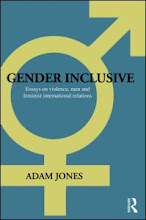UN Report on Rwanda Genocide Threatens Stability in Central Africa
By Harry Verhoeven
The Christian Science Monitor, September 23, 2010
"Until recently, President Paul Kagame and his Rwandan Patriotic Front (RPF) were the international community's aid darling, heralded for their role in stopping the 1994 genocide that claimed the lives of as many as one million Rwandans. They now stand accused of a long list of crimes. A recently-leaked UN report accuses the RPF of atrocities 'that could be classified as genocide' in the Democratic Republic of Congo (DRC) in 1996-1997 -- mass murdering tens of thousands of Hutu refugees. The regime's legitimacy and its leaders' individual criminal responsibility are now being contested. But how wise is it to swap one set of dangerous simplifications for another? Is Rwanda the model of progress and reconciliation, or is Kagame's RPF the genocidal eye of Central African storms? And what does this tell us about international intervention in a region with an immensely troubled past?
... It was once mandatory to demand 'empathy' for the war-ravaged country's authoritarian government. Today it is becoming fashionable among some to blame the regime -- and Kagame himself -- for almost all Central Africa's wrongs. Desiring to denounce the RPF as the brilliantly evil organization 'you love to hate,' too many commentators are now recklessly amalgamating charges of human rights violations, corruption, and bad policy. Some are coming dangerously close to embracing revisionism about the 1994 crimes, too. ... Today, the idea of a 'double genocide' is gaining strength, suggesting that the madness of 1994 was less a one-sided ethnic cleansing of Tutsis, but part of a long and vicious fight between Hutus and Tutsis that became 'uncontrollable.' Unfortunately, and shamefully, it is no longer just Hutu génocidaires and their French silent accomplices who suggest the 'double genocide' hypothesis, conveniently trivializing two decades of anti-Tutsi massacres. [...]"
Friday, September 24, 2010
Subscribe to:
Post Comments (Atom)














The reality is clearly much more complicated. That there may have been retaliatory crimes certainly does not negate the veracity of the crimes committed against Tutsis in 1994. But any retaliatory crimes must be identified and appropriately prosecuted in order to break that cycle, a cycle well-identified in the literature.
ReplyDeleteI fully agree. - AJ
ReplyDelete